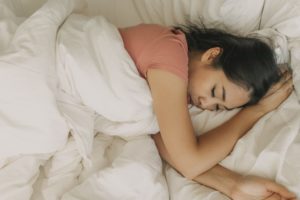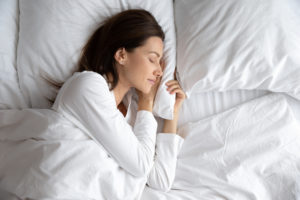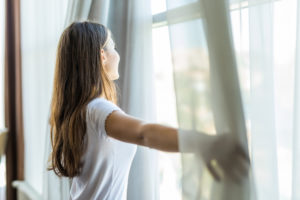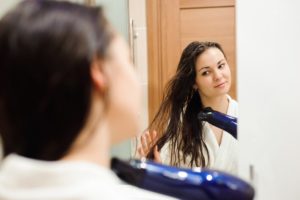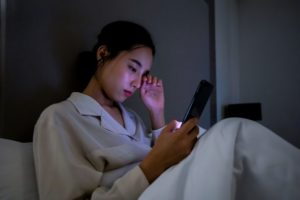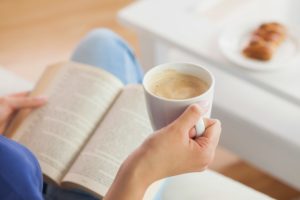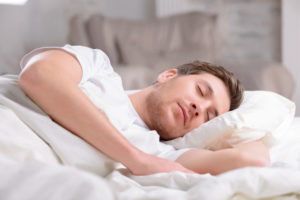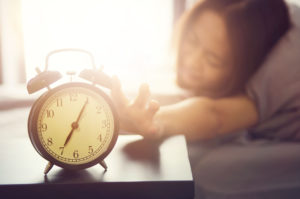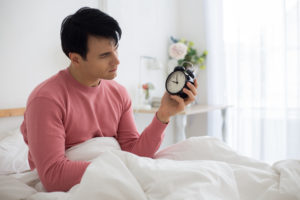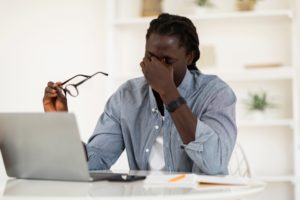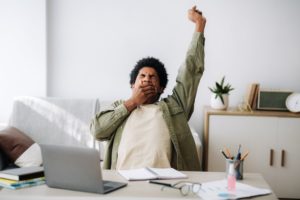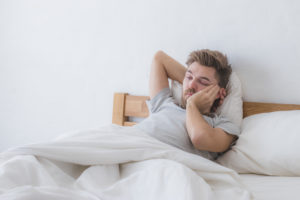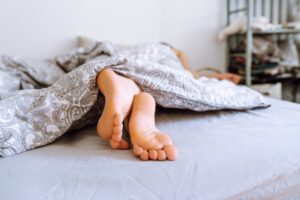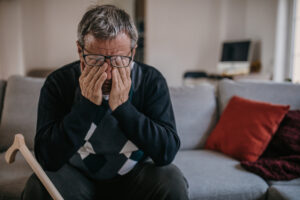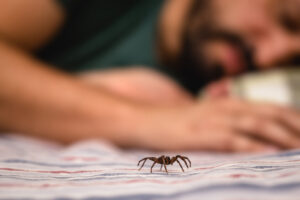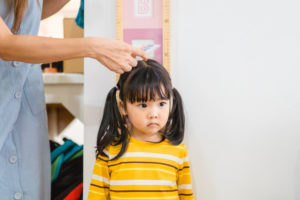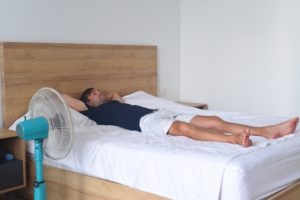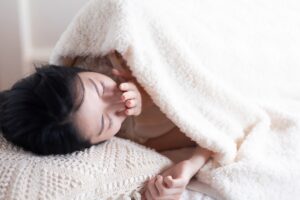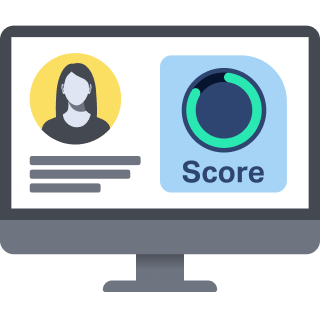How Long Should It Take to Fall Asleep?
- It should take less than 20 minutes to fall asleep.
- Certain factors like health conditions, medications, sleep disorders, and your personal bedtime routine can make falling asleep difficult.
- Simple lifestyle changes, like avoiding electronics before bed, can help make falling asleep easier.
- Speak to a doctor if you are not getting enough sleep or struggle with sleep problems.
Experts estimate that 1 out of 3 adults in the United States suffer from limited sleep, or sleep deprivation. There are many reasons behind this, but one reason may be due to difficulties falling asleep. Sleep latency, the time it takes to fall asleep, varies from person to person. Most healthy people fall asleep within 15 to 20 minutes of lying down. However, some people will fall asleep faster and others may take longer.
If you struggle to fall asleep, it might be frustrating to know that some people are able to fall asleep easily every night. But both falling asleep too quickly and too slowly could signal an underlying medical or mental health concern. So, addressing any of these concerns with a health care provider may help improve sleep.
On the other hand, there may be no known reason behind someone’s trouble with falling asleep. Luckily, there are several tips and tricks available that may help.
What Does It Mean if I Fall Asleep Too Fast?
Most adults with healthy sleep patterns take anywhere from 15 to 20 minutes to fall asleep on a typical night. Some people fall asleep much more quickly. While falling asleep within minutes of lying down may sound desirable, it could be a sign of insufficient sleep or a medical condition.
Sleep Deprivation
When a person gets less sleep than they need to function, they are sleep deprived. The human body has a natural system that helps it fall asleep when it needs rest. The longer a person stays awake, the stronger the drive for sleep becomes. As a result, when a sleep deprived person goes to bed, they will fall asleep faster than someone who is well rested.
Sleep Debt
A person experiencing sleep debt may also fall asleep more quickly than during periods when they are sleeping well. Sleep debt is the difference between the number of hours that a person actually sleeps and the number of hours that a person needs. To make up for lost sleep, a person will need to get extra sleep to make up for the debt. If someone loses sleep several nights in a row, then it may take several more nights of restful sleep to “pay back” the sleep debt.
Medical Conditions
Certain medical conditions can contribute to excessive sleepiness, which can cause a person to fall asleep quickly. For example, brain injuries, disorders of the nervous system, and conditions that affect the heart and lungs can make someone fall asleep faster. Sometimes, people may have chronic excessive sleepiness without a known cause.
Why Can’t I Fall Asleep?
There are many reasons why a person might have difficulty falling asleep. Certain sleep disorders, medical conditions, medications, and the bedtime routine and environment can all cause someone to stay awake long after going to bed.
Insomnia
Difficulty falling asleep and spending long periods of time awake at night are common features of insomnia. Insomnia happens when a person has appropriate chances to sleep but cannot do so.
Insomnia often occurs during periods of stress or a major life change such as a job loss, divorce, or grieving a death.
Some people have short-term insomnia that only lasts days or weeks, while others have chronic insomnia that lasts for three months or longer. Chronic insomnia can also come and go throughout one’s lifetime.
Circadian Rhythm Disorders
Disorders of the circadian rhythm can lead to difficulty falling asleep. A person’s circadian rhythm controls daily cycles in the body including temperature, metabolism, and sleep. Mismatches between an individual’s sleep schedule and their circadian rhythm can make it difficult to fall asleep at a desired time.
An example of this mismatch is jet lag, which can develop temporarily after traveling over at least two time zones. Jet lag happens because the time zone at the destination differs from the traveler’s biological clock. People who travel east typically have difficulty falling asleep at night and feel sleepy in the morning, while people who travel west will feel sleepy in the evening and wake up early in the morning.
People who work night shifts or rotating shifts also may have difficulty falling asleep during their time off. Light is one of the most important signals affecting circadian rhythm. The natural light in the morning makes us alert, while the evening darkness puts us to sleep. When night shift workers try to sleep during the day, light from their environment can make it difficult to fall asleep.
In addition, some people’s circadian rhythms naturally differ from the typical sleep-wake cycle. People with a condition called delayed sleep-wake phase disorder often have difficulty falling asleep until late into the night. In contrast, people with advanced sleep-wake phase disorder fall asleep early in the evening and wake up early in the morning. Advanced sleep-wake disorder is common among older adults.
Mental and Physical Health Conditions
Many mental and physical health conditions are linked to difficulty falling asleep. Insomnia is common among people who have depression or anxiety and people who have experienced a traumatic brain injury . Sleeping difficulties also often occur with chronic pain, heart disease, diseases that cause shortness of breath, and other medical conditions .
Medications
Some types of medications and drugs can interfere with falling asleep. These include:
- Stimulants, including caffeine
- Some asthma medications
- Some antidepressants
- Beta blockers
- Steroid medications
- Some over-the-counter cold medicines
In addition, alcohol and tobacco can both interfere with sleeping, as can withdrawal from sleeping pills .
Be sure to speak with a doctor before stopping or making any changes to your prescribed medication dosage, even if you are concerned that it may be interfering with your sleep.
Poor Sleep Hygiene
Sleep hygiene describes the habits and routines that promote healthy sleep. Unfortunately, when sleep hygiene habits and routines are off, it can sometimes contribute to difficulties falling asleep. Many people struggle to fall asleep in environments that are noisy, brightly lit, too warm or too cold. Taking naps during the day and exposure to blue light from electronic devices within a few hours before bed can also make it difficult to fall asleep.
Signs You May Not Be Getting Enough Sleep
Aside from feeling tired, there are some signs and symptoms that can suggest a person is not getting adequate sleep. These include:
- Irritability
- Difficulty concentrating
- Memory issues
- Trouble with problem-solving
- Poor performance at school or work
- Low sex drive
- Muscle tension
- Headaches
- Bad mood
Although less common, some people with sleep deficiency also experience sleep paralysis. This is when someone temporarily feels as though they cannot move upon first waking up. Sleep paralysis can also involve hallucinations or other vivid images when first falling asleep.
Practical Tips for More Sleep
Many people struggling to fall asleep can improve their sleep through simple lifestyle changes.
- Follow a sleep schedule: Go to bed and wake up at the same time every day, even on weekends and holidays.
- Establish a relaxing bedtime routine: Set aside the hour before bed for relaxing and pleasurable activities such as a warm bath, meditation, reading or listening to quiet music.
- Avoid late afternoon naps: While naps might be appealing to people who are sleep deprived, naps after 3 p.m. can interfere with falling asleep at bedtime.
- Exercise regularly: Research shows that regular exercise helps people fall asleep faster and improves sleep quality and length of sleep. However, try to avoid strenuous exercise late in the day as this may be overly-stimulating before bedtime.
- Avoid caffeine, nicotine, and alcohol before bed: Caffeine and nicotine can both interfere with sleep. While alcohol may make people feel sleepy, studies have found that drinking alcohol in the evening can reduce the quality of sleep.
- Set up a sleep-friendly bedroom: People sleep best in cool, quiet, dark, and comfortable environments. People who need to sleep during the daytime or in bright areas may consider blackout curtains or eye masks to reduce light during sleep. Ear plugs or white noise machines may help sleepers in noisy environments.
- Take a break from technology before bedtime: Turn off the television, phone, computer, tablet or any other electronics at least 30 minutes before bedtime. These devices can be both distracting and stimulating. In addition, blue light from electronic devices can suppress melatonin and make it more difficult to fall asleep.
- Don’t stay in bed if you can’t sleep: If you can’t fall asleep within 20 to 30 minutes of lying down, get up and do something relaxing until you feel sleepy. Don’t return to bed until you feel tired and ready for sleep.
Talk to Your Health Care Provider About Sleep
People should talk to their doctor if difficulty falling asleep significantly interferes with daily activities. People should also consider talking with their health care provider if they feel sleepy during the day despite getting eight or more hours of sleep per night.
A doctor may be able to determine if sleep problems are caused by another condition or a medication. And if altering sleep hygiene doesn’t help sleep problems or daytime sleepiness, then a health care provider may be able to recommend or prescribe other treatments.
References
11 Sources
-
National Heart, Lung, and Blood Institute. (n.d.). Sleep deprivation and deficiency., Retrieved September 14, 2022, from
https://www.nhlbi.nih.gov/health/sleep-deprivation -
Slowik, J. M., Collen, J. F., & Yow, A. G. (2022 Jun 21). Narcolepsy. In StatPearls. StatPearls Publishing., Retrieved September 22, 2022, from
https://www.ncbi.nlm.nih.gov/books/NBK459236/ -
Bonnet, M. H., & Arand, D. L. (2021, June 18). Evaluation and diagnosis of insomnia in adults. In R. Benca (Ed.). UpToDate., Retrieved September 15, 2022, from
https://www.uptodate.com/contents/evaluation-and-diagnosis-of-insomnia-in-adults -
American Academy of Sleep Medicine. (2014). The International Classification of Sleep Disorders – Third Edition (ICSD-3). Darien, IL.
https://aasm.org/ -
National Institute for Occupational Safety and Health. (2020, April 1). Risks from not getting enough sleep. Centers for Disease Control and Prevention., Retrieved September 16, 2022, from
https://www.cdc.gov/niosh/emres/longhourstraining/risks.html -
Murray, B. J. (2021, November 2). Excessive daytime sleepiness due to medical disorders and medications. In T. E. Scammell (Ed.). UpToDate., Retrieved September 23, 2022, from
https://www.uptodate.com/contents/excessive-daytime-sleepiness-due-to-medical-disorders-and-medications -
Goldstein, C. A. (2022, April 5). Jet lag. In R. Benca (Ed.). UpToDate., Retrieved September 19, 2022, from
https://www.uptodate.com/contents/jet-lag -
Lim M. M., & Baumann, C. R. (2021, November 2). Sleep-wake disorders in patients with traumatic brain injury. In T. E. Scammell (Ed.) UpToDate., Retrieved September 19, 2022, from
https://www.uptodate.com/contents/sleep-wake-disorders-in-patients-with-traumatic-brain-injury -
Bonnet, M. H., & Arand, D. L. (2022, April 15). Risk factors, comorbidities, and consequences of insomnia in adults. In R. Benca (Ed.). UpToDate., Retrieved September 19, 2022, from
https://www.uptodate.com/contents/risk-factors-comorbidities-and-consequences-of-insomnia-in-adults -
Neubauer, D. N. (2022, September 12). Pharmacotherapy for insomnia in adults. In R. Benca, & J. G. Elmore (Eds.). UpToDate., Retrieved September 19, 2022, from
https://www.uptodate.com/contents/pharmacotherapy-for-insomnia-in-adults -
Hanson, J. A., & Huecker, M. R. (2022, June 21). Sleep deprivation., Retrieved, September 19, 2022, from
https://www.ncbi.nlm.nih.gov/books/NBK547676/


